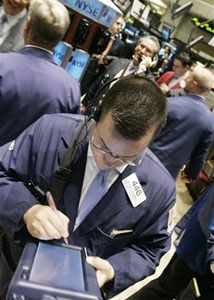US Fed cuts discount rate on loans
Updated: 2007-08-17 22:02
Washington - In a surprise move to calm rattled financial markets, the US central bank made a half percentage point cut on Friday in one of the interest rates that oils the wheels of short-term money lending markets and the economy.
European share prices leapt into positive territory and US stocks shot up in early Wall Street trading, after the Federal Reserve lowered the primary discount rate governing direct loans to banks to 5.75 percent from 6.25.
US share price futures jumped and European shares rose more than two percent after days in the red following a move justified by the Fed on the grounds that risks to the economy had risen appreciably.
"Financial market conditions have deteriorated, and tighter credit conditions and increased uncertainty have the potential to restrain economic growth going forward," the Fed said.
After a tumble of more than five percent in Japanese shares overnight, markets riven by fears of a credit crunch perked up.
Prior to the Fed announcement, European capitals went on the offensive to restore faith in the economy and the banking system at the end of a week of financial turbulence. London, Paris and Berlin rolled out finance ministers on the heels of Asian policymakers to say their economies remained healthy.
French Economy Minister Christine Lagarde, in regular phone contact with vacationing President Nicolas Sarkozy, said there was no systemic crisis. France's economy and banks were in good shape, she said in a series of media interviews.
"This is not a crash, It's a brutal correction in markets," she said in one interview with Le Parisien newspaper.
British finance minister Alastair Darling adopted a similar line on Sky TV. "The UK economy is strong and stable," he said. "The global economy is also strong at this time."
German Finance Minister Peer Steinbrueck said there were no plans to call a meeting of the G7 economic powers, a club his country chairs this year, before a regular gathering scheduled for October.
But governments were keeping in close contact, he said.
Earlier policy chiefs and central bankers in the Asia-Pacific region had urged calm as another bad day wiped more than five percent off the value of Japanese shares on the Nikkei index and the yen surged in currency markets.
The yen's advance, also a consequence of the shift into safe-haven assets in recent days, could make it harder for an export-dependent economy to compete in world markets.
Australia's central bank intervened in the foreign exchange market to halt a slide in the Australian dollar and provided extra cash to the domestic financial system.
Reserve Bank of Australia Governor Glenn Stevens said market behaviour had been "bordering on the irrational" in recent days but he saw signs of stabilisation due to the efforts of central banks.
Friday marked a week since central banks in the Asia-Pacific region joined a global campaign by monetary authorities to calm panicky credit markets by providing extra funding in short-term lending markets.
Since then, Asian stocks outside of Japan have shed more than 10 percent, their biggest weekly decline since January 1998. Fears of further falls were rife despite the efforts of the central banks.
Japan's Nikkei fell 5.4 percent, its biggest percentage drop since September 12, 2001, to its lowest close in a year.
|
|
|
||
|
||
|
|
|
|

